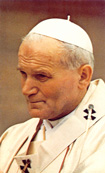|
 The
opening and closing The
opening and closing
 37. At present, in different parts
of the Church, there are many ways to introduce the Rosary.
In some places, it is customary to begin with the opening words of
Psalm 70: "O God, come to my aid; O Lord, make haste to help me",
as if to nourish in those who are praying a humble awareness of their own insufficiency.
In other places, the Rosary begins with the recitation of the Creed,
as if to make the profession of faith the basis of the contemplative journey
about to be undertaken. These and similar customs, to the extent that they
prepare the mind for contemplation, are all equally legitimate. The Rosary is
then ended with a prayer for the intentions of the Pope, as if to expand the vision
of the one praying to embrace all the needs of the Church. It is precisely
in order to encourage this ecclesial dimension of the Rosary that the Church
has seen fit to grant indulgences to those who recite it with the required dispositions. 37. At present, in different parts
of the Church, there are many ways to introduce the Rosary.
In some places, it is customary to begin with the opening words of
Psalm 70: "O God, come to my aid; O Lord, make haste to help me",
as if to nourish in those who are praying a humble awareness of their own insufficiency.
In other places, the Rosary begins with the recitation of the Creed,
as if to make the profession of faith the basis of the contemplative journey
about to be undertaken. These and similar customs, to the extent that they
prepare the mind for contemplation, are all equally legitimate. The Rosary is
then ended with a prayer for the intentions of the Pope, as if to expand the vision
of the one praying to embrace all the needs of the Church. It is precisely
in order to encourage this ecclesial dimension of the Rosary that the Church
has seen fit to grant indulgences to those who recite it with the required dispositions.
 If prayed
in this way, the Rosary truly becomes a spiritual itinerary in which
Mary acts as Mother, Teacher and Guide, sustaining the faithful by her powerful
intercession. Is it any wonder, then, that the soul feels the need, after
saying this prayer and experiencing so profoundly the motherhood of Mary,
to burst forth in praise of the Blessed Virgin, either in that splendid prayer
the Salve Regina or in the Litany of Loreto? This is
the crowning moment of an inner journey which has brought the faithful into
living contact with the mystery of Christ and his Blessed Mother. If prayed
in this way, the Rosary truly becomes a spiritual itinerary in which
Mary acts as Mother, Teacher and Guide, sustaining the faithful by her powerful
intercession. Is it any wonder, then, that the soul feels the need, after
saying this prayer and experiencing so profoundly the motherhood of Mary,
to burst forth in praise of the Blessed Virgin, either in that splendid prayer
the Salve Regina or in the Litany of Loreto? This is
the crowning moment of an inner journey which has brought the faithful into
living contact with the mystery of Christ and his Blessed Mother.
|

